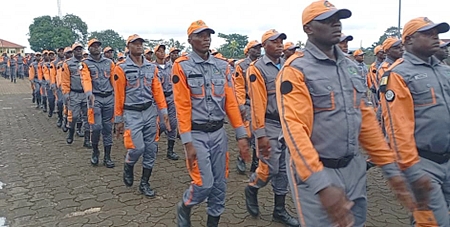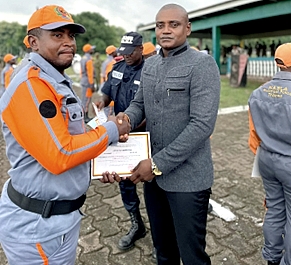On Tuesday 1 July 2025, 182 trainees from the 2nd Training Session for Municipal Police Officers at NASLA received their certificates of completion of training at the Mutengene Police Training College (CIAP). The ceremony was presided over by the Director General of NASLA, in the presence of the representative of the Minister of Decentralization and Local Development and CIAP Officials.

Municipal police training is in line with the implementation of the presidential Decree of 9 August 2022 to lay down conditions for carrying out Municipal Policing, which gives NASLA exclusive responsibility for the basic, refresher and specific training of Municipal Police officers. Moreover, Article 33 gives Councils a transitional period of 18 months from 9 August 2022 to comply with the new arrangements.
The aim of this training is to upgrade the skills of Municipal Police officers sent by Councils, City Councils and Sub-divisional Councils, thereby helping to improve the performance of Municipal Police services.
The training focuses on developing the trainees' skills. The various courses and methods are designed to improve the trainees' knowledge, skills and attitudes in the main areas of work of Municipal Policing, as defined by the Presidential Decree of 9 August 2022.
In this regard, the 182 trainees were trained for over three months on:
- the fundamentals of Municipal Policing;
- Municipal Police Law;
- the organisation and functioning of Municipal Police services;
- the drafting of procedural documents;
- conflict and stress management;
- Social mediation;
- communication and conflict management;
- non-violent communication;
- collaboration with the National Police and other armed forces.
The practical part of the training included:
- practical workshops and intervention exercises;
- daily sports sessions;
- physical skills enhancement and intervention simulations.

Mr TANYITIKU E. BAYEE made a number of recommendations to the trainees of the 2nd Training Session for Municipal Police Officers: “The challenge of urban sanitation that you are called upon to face together with the Mayors and the local population requires you to be professional in your work and in the way your patrols operate, and even in the way you immobilise and impound vehicles.” You must also encourage civic participation in your day-to-day interactions with users, and demonstrate a high level of respect for ethics and professional conduct“
